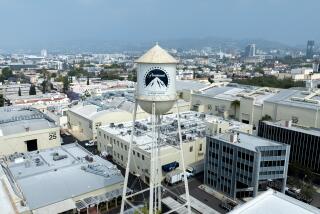Who’ll Pay for a Media Mogul’s Metromedia?
Billionaire John Kluge, with frustrated shareholders breathing down his neck, wants to unload the entertainment assets of his publicly traded Metromedia International Group and has held exploratory talks with a few parties, including Morgan Creek Productions.
Sources say Kluge wants to focus exclusively on the company’s core business: telecommunications in Eastern Europe, Russia and China.
Kluge may have been inspired by the recent $1.3-billion sale of MGM, but judging from the lack of action on some other established movie companies such as New Line Cinema and Castle Rock Entertainment, he may have a way to go before investors warm up to the kind of price he has in mind for his struggling operation: about $700 million.
Metromedia’s Entertainment Group, the umbrella company for Kluge’s entertainment outfits, includes Orion Pictures, Motion Picture Corp. of America, which produced “Dumb and Dumber,” and Samuel Goldwyn Co., which has an 850-title film and TV library and owns the specialized movie chain Landmark Theater Group with more than 150 screens in 52 theaters.
Financial sources say before Kluge can hope to fetch any kind of premium for the group, he’ll have to get Orion’s production and distribution operations up to speed so the combined companies will be a more attractive asset to investors. The once-vital studio, known for such hits as “Dances With Wolves” and “Silence of the Lambs,” has essentially been inert since going through bankruptcy reorganization in 1992.
Kluge’s longtime trusted lieutenant, Stuart Sabotnick, who runs the day-to-day operations of Metromedia, could not be reached for comment Monday. Sabotnick has long insisted that Kluge is a builder, not a seller, but discussions with various parties suggest otherwise.
Media analyst Frederick Moran at Furman Selz said, “Kluge has definitely engaged in informal discussions with major entertainment companies, though he hasn’t hired an investment banker and there’s not an official book” on the company.
Sources say that although Kluge hasn’t initiated any discussions, in addition to meetings with representatives of Morgan Creek, he’s also talked with PolyGram chief Alain Levy--though those talks have so far led nowhere--and executives from at least one other entertainment firm.
*
Morgan Creek and PolyGram, both wanting to expand their libraries and distribution capabilities, each bid for MGM last year but lost out to Las Vegas billionaire Kirk Kerkorian, who backed a management buyout of the studio for $1.3 billion. PolyGram had also made an earlier play to buy Goldwyn but was upstaged in the eleventh hour by Metromedia.
Sources said once MGM was taken off the market, Morgan Creek--the producer of such films as the popular Jim Carrey vehicles “Ace Ventura Pet Detective” and its sequel, and “Robin Hood: Prince of Thieves,” which starred Kevin Costner--approached Metromedia and has been looking at the company for the last four to six weeks, though price has not been discussed. Morgan Creek executives declined comment.
One source with knowledge of preliminary discussions said “nothing substantive has happened,” primarily because Kluge is looking for a lot more money than any of these parties are willing to shell out, which is $500 million or less.
“Kluge is looking for a premium,” said the source, noting that the billionaire knows that in order to maximize the value of the entertainment group, he has to “build it up and get it back on stream . . . otherwise you’re selling damaged goods.”
Mark Manson, an analyst with Donaldson, Lufkin & Jenrette, said that if Kluge can reinvigorate the entertainment group with box-office hits, Metromedia’s value can rise dramatically.
That’s a tall order given the highly competitive marketplace and the high-risk, low-margin movie business.
Nonetheless, industry analysts say Kluge is confident that eventually the entertainment group could retrieve between $700 million and $1 billion, primarily because it boasts the fourth-largest library in the world with 2,200 titles. A good portion of that is the Orion catalog, which has such Oscar-winning best picture titles as “Platoon” and “Amadeus,” but also includes lots of “B” movies from the defunct American International Pictures catalog.
Goldwyn is best known as a distributor of high-quality, specialized films such as “Much Ado About Nothing” and “The Madness of King George. Its TV library includes shows such as “American Gladiators.”
Moran estimates the value of the combined libraries to be as much as $700 million, or $10 a share. Metromedia, he contended, “is such an undervalued security with the stock at $11 a share.”
Those who know him say Kluge’s sole objective in shedding the entertainment holdings is to boost Metromedia’s stock price, which has been on a down slide at least since late 1995.
“Right now, Wall Street analysts and investors in general view this as a hodgepodge of businesses,” Moran said.
Moran said combining the entertainment assets with the telecommunications business has created “a kind of clash that hurts the company from a valuation standpoint.”
A source close to Kluge agrees: “Metromedia is worth a lot more money as a pure play in telecommunications. The entertainment companies cloud it.”
Metromedia’s telecommunications business is centered on Eastern Europe, Russia and China, where it has acquired licenses and properties in wireless cable systems, mobile radio systems, paging and international toll-call services and radio and TV stations.
Kluge’s original plan was to acquire film companies that could feed programming content to Metromedia’s cable channels abroad. But sources say a number of factors have convinced the billionaire that selling the entertainment assets would be more beneficial than keeping them.
The still-active Kluge, 82, has a net worth of $7.2 billion, ranking fourth on the latest Forbes 400 list.
Kluge made his initial foray into the film world a decade ago as a favor to his friend, the late Arthur Krim, one of the founders of Orion. Waging a fierce battle in 1988, he succeeded in buying out Viacom Chairman Sumner Redstone’s shares in Orion for $204 million to gain control of the company. After suffering from excessive overhead and a string of box-office flops, Orion filed for Chapter 11 and subsequently emerged from bankruptcy significantly pared down and no longer a vital company.
*
In late 1995, Kluge acquired Motion Picture Corp. of America, which produces low-cost films, for $22 million. Months later he paid $115 million for debt-ridden Samuel Goldwyn Co.
Last year, Kluge had also planned to buy Alliance Entertainment Inc., a New York-based distributor of recorded music, but scratched the $533-million stock deal in April 1996 after declining music sales cut Alliance’s operating cash-flow estimates.
Sources say Kluge had also considered buying MGM last year, but the price he wanted to pay was too low. A source close to Metromedia suggests that after MGM sold for $1.3 billion, “a lightbulb went off” in Kluge’s head that his company’s library might be worth even a third of that.
The source also believes that another contributing factor to Kluge’s about-face strategy to focus on Metromedia’s primary business as a telecommunications company might have been the lackluster numbers he saw on the music front, a la the Alliance deal.
By June of last year, it was clear that Kluge wanted to keep his two businesses separate, said the source, evidenced by the structure of a secondary offering so that all of the proceeds went exclusively to the telecommunications side.
As for the entertainment group, whose combined debt is north of $200 million, a bank loan was secured through Chase Securities (formerly Chemical Bank), giving the companies a $100-million revolving credit facility for production and distribution.
More to Read
The biggest entertainment stories
Get our big stories about Hollywood, film, television, music, arts, culture and more right in your inbox as soon as they publish.
You may occasionally receive promotional content from the Los Angeles Times.










